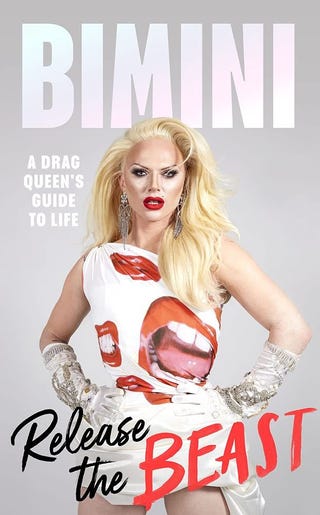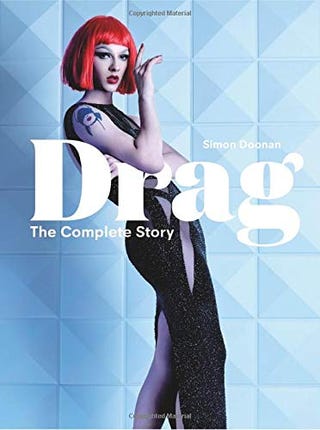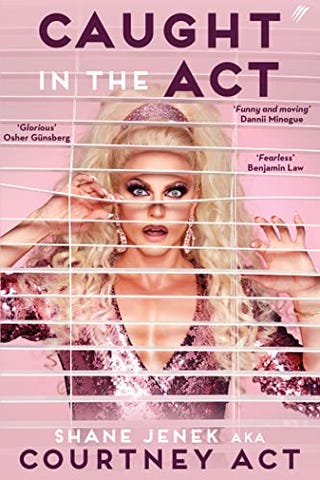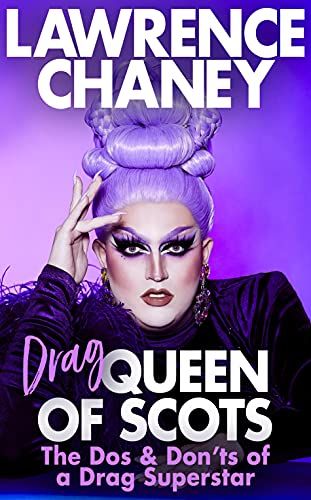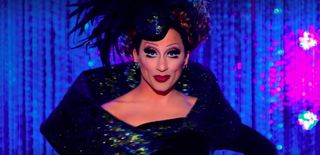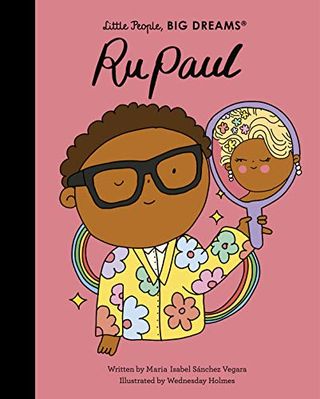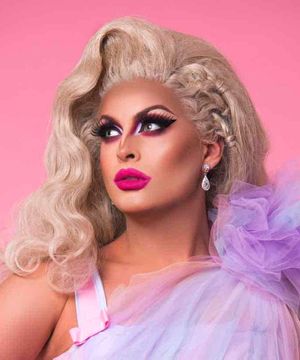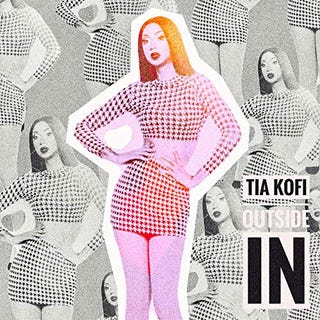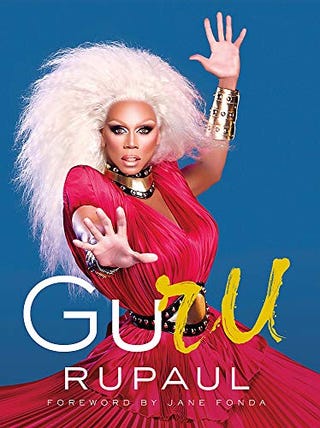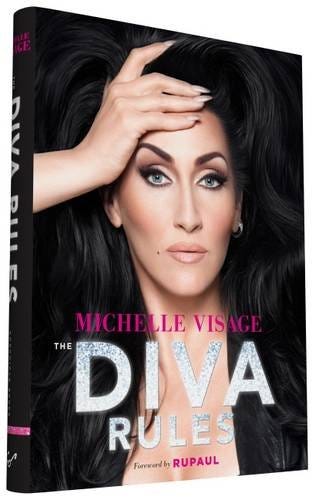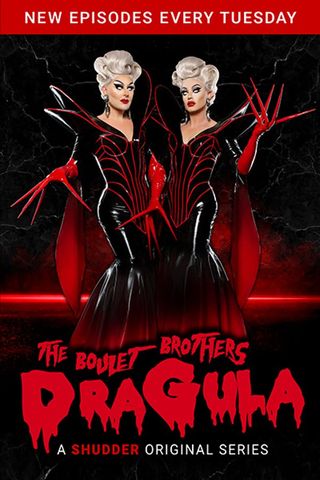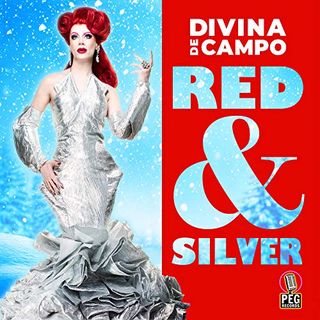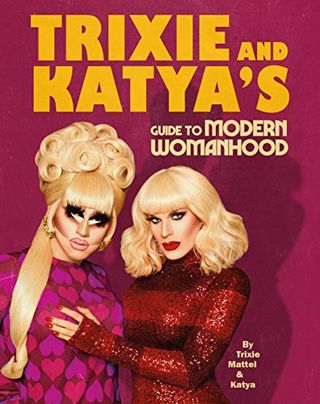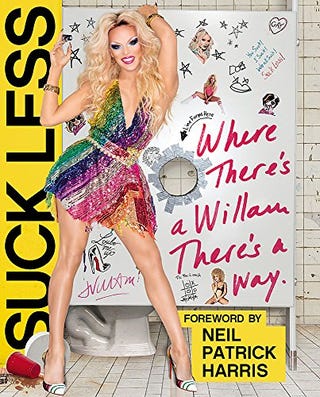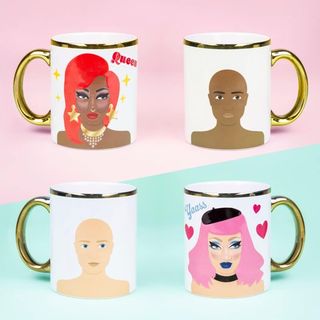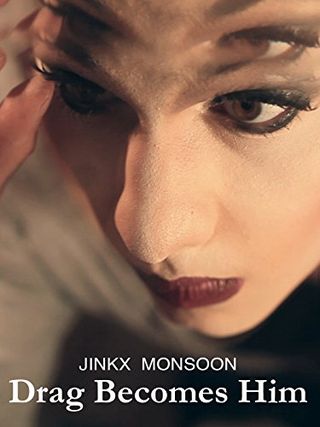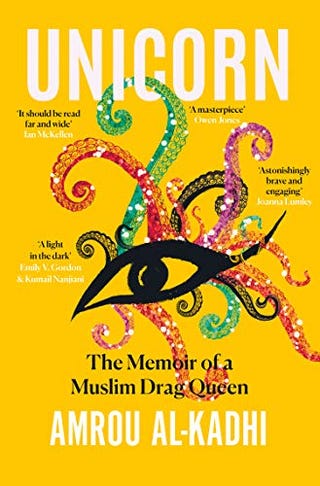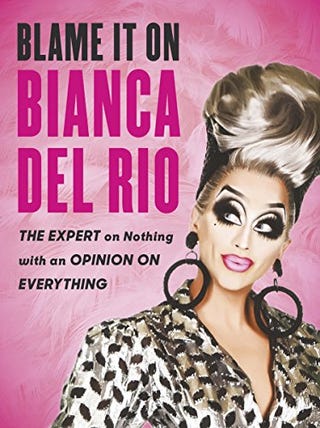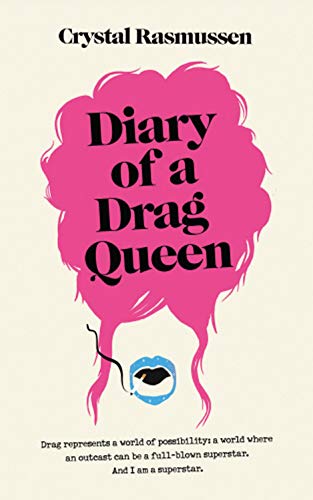Rainbow Crew is an ongoing interview series that celebrates the best LGBTQ+ representation on screen. Each instalment showcases talent working on both sides of the camera, including queer creatives and allies to the community.
Next up, we're speaking to Dakota Schiffer about her time on Drag Race UK season four.
They weren't kidding in that latest season four trailer when we were told to brace for "a shocking elimination no one will see coming." And it turns out that Dakota Schiffer herself didn't expect it either.
"I did not think I was lip-syncing that episode," she tells us the day after her surprise exit. "I really did think I did a good job."
And so do we, quite frankly. "Robbed" isn't a word we like to throw around here too often, but if we're judging this challenge purely on the makeover, then Dakota absolutely deserved to be safe this week. Make of that what you will.
It's not all bad though. In Dakota's own words, "The doll may have left the valley, but she certainly made her mark."
Digital Spy caught up with the herstory-making queen herself to discuss all the ways she made that mark, whether it be reframing how drag can look on this show to inspiring trans viewers watching back home.
What’s the fan response been like since your exit? I’m sure you must have got a lot of love online since then?
My phone’s been hot. I think it’s overworked a little bit, this morning.
It’s been so overwhelming. The love has just been unmeasurable, and I’m just so grateful. I don’t think I ever imagined this reaction. I don’t think you ever really can. Even so, it’s just been so surreal, and I’m just grateful that people enjoyed what I did there, in the time that I had there. I’m just very grateful that people were rooting for me. It really means the world.
During your werk room chat at the end, you brought out a special jumper. Would you mind telling us why that jumper means so much to you?
That jumper, I don’t want to spoil too much, because it's for one of the runway themes. It might not look very special when I’m throwing it on after I’m crying all my makeup off. But it was part of a runway look.
My twin knitted that jumper for me. And every week, I just wanted it to be that runway theme, because I was like, "Oh my God, my twin spent 12 days knitting straight to get this jumper for me for this runway, while they were writing their dissertation."
It’s probably the most sentimental outfit I brought. I just wanted it to walk the runway so badly. Honestly, half the reason why I was so devastated about leaving, was because it didn’t get to see the light of day. Every time I talked about that jumper, everyone on the cast knew that bloody jumper, because I was like, "Look what my twin knitted for me!"
When I was eliminated, I was like: [comic crying voice] "Can I please grab it? Please, let me wear this jumper. The UK has to see this."
Not that it’s that special, but it was very special to me, and I’m very grateful. Me and my twin were… waterworks were going very strongly, watching that happen. But I’m just grateful that their amazing knitting got to make television. Maybe not on the runway, but during my exit speech, I think it’s pretty memorable, so I’m very glad.
During your critiques, Michelle Visage said she feels like you have potential to do more than you did. Do you think that was fair?
I think… it’s funny. Because a lot of the critiques of my aesthetic throughout the season were quite limited... I felt really kind of insecure about my drag while I was there, because I think we’re not necessarily used to seeing someone with my aesthetic on Drag Race before.
Not only is it distinctively trans but a lot of people are… I think they sometimes get confused about whether something’s draggy enough, or the transformation aspect of drag. That’s not crucial to the history of drag.
Trans women have been the backbone of this community for years, and are also crucial to the history of drag. And also drag competitions, like Miss Continental and everything.
I think maybe the public – or the audience of Drag Race UK – aren’t used to seeing someone who looks like me on the show. I think my drag was being viewed through the lens of: I’m not an 8ft Venus Fly Trap – "therefore what the hell is she doing?"
But I would never do that. I’m glad that I did what I did, and everyone’s come away knowing who I am, clearly. And I said that on Untucked: I have a strong aesthetic. There’s no point in saying you prioritise visuals in drag if you don’t have something to identify you with.
I get sent so many things all the time from fans, from like '60s pages or Pinterest: "I thought this was you." To me, that’s the best compliment, because it means that you’ve done your research. You’ve done your history on fashion. And that’s what makes my heart the most warm, when I get those kind of affirmations.
My aesthetic isn’t for everyone, and it might not be the most flashy or grand or expensive. But it certainly got to the right people. And I’m just very grateful that the fans love it, even if the judges were a bit bored [laughs].
If you could speak to the judges now, what would you say to them?
I think my business with the judges was settled that day. I don’t have a problem with that. There’s nothing I’d like to say.
I felt quite defeated towards the end of it, because I did not think I was lip-syncing that episode. I really did think I did a good job.
The family resemblance aspect of the challenge was to do your drag character. When they were asking for more variety on the runway, I remember literally looking back at them and saying, "Why would I give you variety in this challenge, when it’s to make someone… my drag family member? It wouldn’t make sense for me to go super '80s punk with this runway. Because why would someone, being a Schiffer, dress that way?"
To me, it just didn’t make sense. They must have been bored, quite frankly, with the '60s aesthetic. And I get it.
I look at my runway themes now, and I think: to me, I notice the differences, because I’m a very detail-oriented person. But I understand that my runway’s probably a little simple next to everyone else’s. And I don’t know if that’s a financial aspect or just my aesthetic in general.
I don’t know if I could say anything else to the judges. I got what I wanted. I remember saying on episode three, when they gave me those critiques about my sewing challenge – I remember walking into the workroom on episode four, and being like, "Send me home. I got what I wanted."
They told me I got fashion, they told me I can make a nice dress, and they told me I walk the runway like a model. I remember just being on cloud nine that whole morning, when we were filming confessionals. Because that’s what I wanted. That’s the affirmation I wanted.
I remember saying: I’ve never been this validated before. But I’ve been a bit downhill from there. From episode three, I was feeling very, very happy.
You mention the financial aspect here, and I've also seen you discuss those constraints before on social media too. It's something that impacts a lot of the queens on Drag Race UK. Is there anything you would have done differently if that hadn't been a factor?
I would have loved to have worn couture on the runway, as we all probably would. I try not to think about stuff like that for the sense that… if I’m overly critical about what I did there, it would be demeaning the work I did.
For me, I was so self-critical while I was there, mentioning that I was defeated while I was there. That was a running theme for me, the entire season. And I don’t think we actually saw how in my head I got in a lot of challenges, because I have a tendency to be very self-critical. I didn’t have a lot of self-confidence before going in.
That’s the last thing I said. I went, "Thank you for giving me confidence." Because at that point in the competition, I remember standing there, thinking… It was the first runway I really felt like I deserved to be there.
So to be sent home was a bit soul-crushing. But I really felt like that confidence that I’d never had, has come since the show. Although I try not to think about what I would have done, and what I could have done. Because not only is it a little bit upsetting, and makes me a little choked, but, also, I’m proud of what I did with what I had.
I think my Pink runway is one of my favourites, and I’m so glad I got to wear that one. I did everything I wanted to do on that stage. Apart from that jumper. And another runway… Well, there were only two runway looks left. What am I like?
But, you know, I’m proud of what I did, and I just try not to think about that kind of stuff, because otherwise I think I’ll go upsetting myself, if I was like, "I wish I was Schiaparelli on the runway." We can all dream.
You really should be so proud of everything you've achieved on the show.
Thank you. There are so many designers and grand plans I would have loved to have designed. But it wasn’t in my financial budget.
Whenever I think about what I would have loved to have worn; there’s Drag Race Italia, a makeover challenge, where Farida [Kant] pours blood all over herself. If that gown – without the blood, because I’m not necessarily a horror queen. That gown, in mint green, I might be giving Frida a DM, because I know she made it herself, which is incredible.
It’s one of my favourite runway looks of all time. If that was my finale, I would have been very pleased.
As the first openly trans queen on Drag Race UK, your journey has resonated with so many people. What’s that experience been like for you in terms of the fan response? Has it also been affirming for you personally as well, to share your story on such a huge platform?
Absolutely. It was my main driving force for applying for the season. I think I went on with a very different goal to a lot of people. A lot of people were representing themselves, and only themselves. And I did feel quite a bit of pressure to represent an entire community, which is obviously no small feat to be able to.
But I feel like the messages that I’ve got from people, and the response I’ve had from young trans people – any trans person that’s messaged me – has just been so affirming, because it’s been the reason why I did it.
To be a representation of not only just a trans person but a trans person who is funny and vibrant and silly and can also have heart-warming moments and speak for herself – I feel so proud of the way I represented myself, and the way I’ve come across.
I’m grateful that the UK gets to see that trans people are just regular human beings with vibrant lives. They’re funny and interesting, or at least I’d like to – maybe I’m bigging myself up a bit here [laughs].
I’m grateful that that is the response that I’ve received. For people that don’t know any trans people, or don’t have any trans people in their lives – I’m in their living rooms on the BBC. I might be one of the first trans people that they’ve ever really had for a conversation outside of some sensational and horrible transphobic interview on Good Morning Britain or something.
But I’m glad that it’s a positive portrayal, when sometimes the trans community seem to only get doom and gloom. It’s very nice to see that positivity.
There were some episodes where I was specifically talking about trans issues. That’s very crucial to me. Don’t get me wrong. But there were also episodes where it wasn’t mentioned, and I’m just existing. I’m equal to everyone in the workroom.
That is also an accomplishment in itself, that you’re not constantly justifying yourself and explaining yourself to be there. You’re seen as an equal. Everyone treated me as an equal. So that was amazing.
RuPaul’s Drag Race UK season 4 airs on Thursdays at 9pm on BBC Three and BBC iPlayer. It streams on WOW Presents Plus in the US.
Interested in talking about all things Drag Race? Visit our dedicated sub-forum






